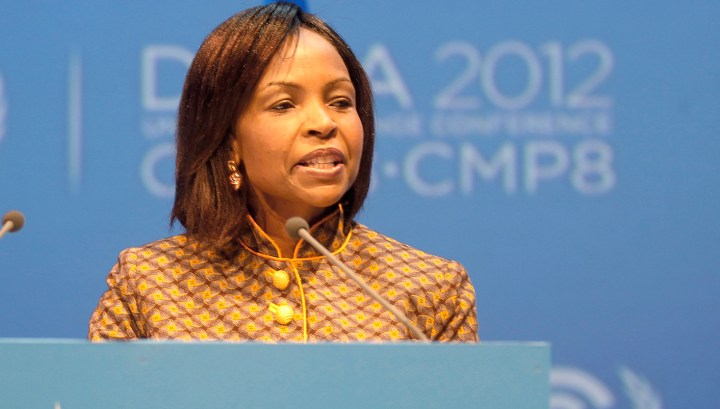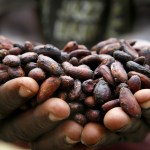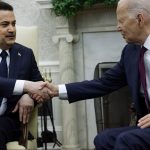World
Analysis: The world according to DIRCO

Maite Nkoana-Mashabane’s speech in Pretoria on Tuesday was billed as a kind of State of the Nation for South African foreign policy – a chance for the foreign minister to defend her decisions of the past five years and lay out her vision for the future. In the end, it was actually a missed opportunity, with the minister choosing to focus on process and procedure rather than concrete achievements (good or bad). And please, nobody mention Rwanda. By SIMON ALLISON.
Maite Nkoana-Mashabane has always looked very comfortable as foreign minister, a position she has occupied since 2009 (and looks likely to occupy again, although she refused to be drawn on the subject). Sharp, eloquent and assured, she has no trouble schmoozing visiting politicians or staring down pesky journalists – both essential requirements for the job. She is also a natural diplomat, and over the last five years has mastered the art of saying plenty without actually saying anything at all.
It was this skill that was most evident on Tuesday afternoon in Pretoria, where she delivered her foreign policy follow up to Jacob Zuma’s State of the Nation address. In a tightly-scripted speech, she laid out the principles that govern South African foreign policy (Ubuntu, human rights, world peace and all that good stuff) and explained what her department has been doing to uphold them.
Here’s the minister’s highlights reel. Since 2009, South Africa has been instrumental in: strengthening the African Union Commission (presumably through Chairperson Nkosazana Dlamini-Zuma, whom Dirco crow-barred into position, although she was not mentioned explicitly); championing new African infrastructure projects like the Durban to Cairo trade corridor; pushing through United Nations Security Council resolution 2033, which strengthened the Security Council’s relationship with the African Union; nurturing regional integration; hosting the 2013 BRICS Summit; and facilitating international climate change discussions.
It is a substantial list of accomplishments (although a few are worthy of debate). It is, however, curiously incomplete: despite the captive audience, Nkoana-Mashabane not only declined to talk about the biggest controversies of her tenure (Dlamini-Zuma’s election, say, or last year’s humiliation in the Central African Republic), but she also failed to mention her highest-profile successes.
Madagascar, for instance, has been an almost textbook example of our famed quiet diplomacy in action, and it seems to have worked – the country has a new president after peaceful elections, and has had international sanctions lifted. South Africa has also been praised for its role in the Democratic Republic of Congo, where, as part of a UN peacekeeping experiment, our troops were essential in the military defeat of the M23 rebel movement.
The minister reserved her strongest words for the United Nations itself, knowing perhaps that she is on well-supported ground in calling for reform of the Security Council. “It remains a matter of serious concern that, close on 70 years of its existence, the UN Security Council remains undemocratic, unrepresentative and unfair to developing nations and small states…we cannot remain beholden indefinitely to the will of an unrepresentative minority on most important issues of international peace and security.”
Things got more interesting during the question and answer session, when – inevitably given the breakdown in relations – the topic of Rwanda dominated proceedings. Nkoana-Mashabane played coy, however, admonishing journalists to allow police to complete their investigation. “Whatever actions we will take will be unemotional. Yes, evidence [against the expelled Rwandan diplomats] does exist, but please let’s allow law enforcement agencies to do their work. We did what normally gets done in these situations.”
This “unemotional” public response seriously underestimates just how much of a gamble South Africa is taking by forcing the issue with Rwanda, regardless of the rights and wrongs of the situation. It has the potential to drive a serious wedge in some very important relationships with other African countries, perhaps even dividing the continent along nasty ‘us versus them’ lines. Behind the scenes, however, informed speculation suggests that the minister and her inner circle are taking the situation very seriously indeed, and have just returned from a whirlwind trip of Central African nations (no, not Rwanda) in an effort to drum up support.
On the other big issues of the day, Nkoana-Mashabane offered little for the headline writers. A brief assertion that “we remained engaged in the Central African Republic” – we’re not sure how exactly, either – and then this gnomic utterance on the Crimean referendum, which left everyone baffled: “We also know that this is not the first referendum to take place,” she said. Thanks for that pearl of wisdom, Minister.
Overall, Nkoana-Mashabane’s foreign policy-focused State of the Nation told us little we didn’t already know, and she carefully deflected the questions she didn’t want to answer. The obfuscation was frustrating, but she’s undeniably good at it – and that’s probably why she’s the favourite to retain her position as South Africa’s top diplomat. DM
Photo: South Africa’s Foreign Minister and President of the (COP 17) Maite Nkoana-Mashabane speaks at the opening session of the United Nations Climate Change (COP18) in Doha November 26, 2012. REUTERS/Mohammed Dabbous

















 Become an Insider
Become an Insider